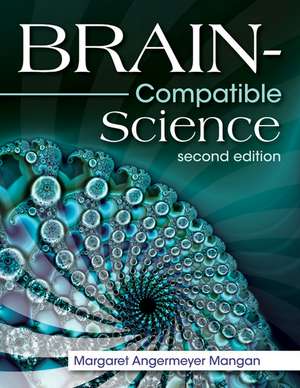Brain-Compatible Science
Autor Margaret Angermeyer Manganen Limba Engleză Paperback – 13 noi 2006
Gain fresh insights for teaching, learning, and assessing knowledge of critical science concepts through the exploration of research-based practices for science education. Brain Compatible Science, Second Edition shows teachers how to incorporate practices such as constructivism and inquiry-based learning into their science instruction to help students move beyond memorising facts to deeper levels of understanding.
Linked to National Science Education Standards, this resource also provides an abundance of fully developed science lessons that give students maximum exposure to new ideas and ways of thinking. Easily adapted to any science curriculum, the lessons include:
- Learning objectives, assessment rubrics, and checklists
- Background information
- Pre-activity discussions with step-by-step procedures
- Reproducible pages
- Closure and extension suggestions
This powerful model of science instruction invites students into a meaningful inquiry, helping them develop positive attitudes about science, and ensuring that they understand important concepts and principles.
Preț: 315.29 lei
Nou
60.34€ • 65.52$ • 50.68£
Carte tipărită la comandă
Livrare economică 23 aprilie-07 mai
Specificații
ISBN-10: 1412939968
Pagini: 248
Dimensiuni: 216 x 279 x 12 mm
Greutate: 0.59 kg
Ediția:Second Edition
Editura: SAGE Publications
Colecția Corwin
Locul publicării:Thousand Oaks, United States
Recenzii
"A model of science instruction that promotes deep understanding of processes and principles, meaningful transfer of learning to new settings, and a positive attitude toward the role of science and technology in society that will help today’s students develop into tomorrow’s informed decision makers."
Cuprins
Preface
Acknowledgments
About the Author
Introduction: Envisioning a New Paradigm for Science Education
I. Chaos Theory
1. Fractals: A Metaphor for Constructivism, Patterns, and Perspective
2. Iteration: A Metaphor for Change in Science Curriculum and Information Management
3. Sensitive Dependence on Initial Conditions: A Metaphor for Change in Gender Equity and Diversity
4. Strange Attractors, Phase Space, and Phase Portraits: A Metaphor for Change in Learning Environments and Habits of Mind
5. Bifurcations and Period Doubling: A Metaphor Featuring Choices, Joy, and Surprise
6. Turbulence: A Changing Perspective of Discipline and Classroom Management
II. New Science Principles: Implications of New Science Principles for Science Education
7. A New Look at Evolutionary Biology: A Metaphor for Change in Curriculum Integration and Localization
8. A New Look at Self-Organization: A Metaphor for Change in Knowledge Construction
9. Dissipative Structures: A Metaphor to Emphasize the Significance of Community and Values
10. Quantum Mechanics: A Metaphor for Change in the Power of Relationships, Energy, and Paradox
III. Chaos Theory and New Science Principles Summary
Glossary
References
Index
Notă biografică
Margaret Mangan is an award-winning educator whose teaching experience spans 36 years and grades 1 through 8 in Wisconsin schools. Most recently, Margaret taught science at Whitefish Bay Middle School, and prior to that was a science specialist for elementary schools in Whitefish Bay. Operating from a cart, Margaret traveled to forty-one classrooms a week to teach hands-on science to first through fifth graders. Drawing from inquiry, constructivist, and brain-based learning models, Margaret uses a variety of teaching strategies that address diverse learning styles. In addition to working with students, Margaret presents hands-on science workshops for educators. Margaret has a Master¿s of Education in professional development with an emphasis in science education from Cardinal Stritch University in Milwaukee.
